A Cinematic Revolution
 V FOR VENDETTA opened strong, but is already fading due to spreading word that a political fable was wrongly marketed as a MATRIX style action picture. (That’s all it takes these days to downgrade a film to “I’ll wait for DVD”.)
V FOR VENDETTA opened strong, but is already fading due to spreading word that a political fable was wrongly marketed as a MATRIX style action picture. (That’s all it takes these days to downgrade a film to “I’ll wait for DVD”.)Light on action, VENDETTA still moves with purpose and isn’t weighed down by its heavy political ideas. The bulk of the film is a gripping detective thriller with pulse-quickening turns and surprising revelations about a terrorist (or is it revolutionary) who wears a mask and calls himself ‘V’.
VENDETTA is promoted heavily as a film from the creators of THE MATRIX TRILOGY, which is a disservice to first time director James McTeigue, who shows incredible flair and deft skill with handling the film’s tricky tone.
 Having said that, a great amount of credit is due to The Wachowski Brothers for their fine screenplay. After bungling the MATRIX sequels by overstuffing them with half-baked philosophy, they’ve reestablished their artistic credentials (and my good faith) with a crackerjack adaptation of Alan Moore’s graphic novel.
Having said that, a great amount of credit is due to The Wachowski Brothers for their fine screenplay. After bungling the MATRIX sequels by overstuffing them with half-baked philosophy, they’ve reestablished their artistic credentials (and my good faith) with a crackerjack adaptation of Alan Moore’s graphic novel. While doing research, I was surprised how much the Wachowski’s changed and rearranged Moore’s plotting since the final product plays like a tightly structured book. Even a last minute, seemingly removal sub-plot about a lesbian actress quickly adds layers of importance to the overall story.
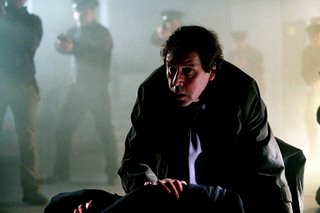 The script’s one misstep is a strange monologue by the detective hunting V. As his allegiance begins to shift he talks about seeing the past in a different way (padded with snippets from the film we’ve already seen). He goes on to talk about seeing the future as well? (This also contains spoiler-like images, further emphasizing that the whole scene should have been removed.)
The script’s one misstep is a strange monologue by the detective hunting V. As his allegiance begins to shift he talks about seeing the past in a different way (padded with snippets from the film we’ve already seen). He goes on to talk about seeing the future as well? (This also contains spoiler-like images, further emphasizing that the whole scene should have been removed.)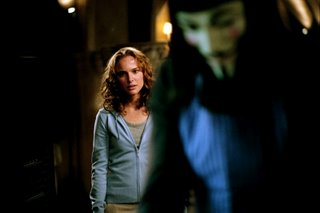 Natalie Portman is the big movie star here, and she does a fine job, but she’s actually in the film less than Stephen Rea, who plays Finch, the aforementioned Detective. He’s about as good as I’ve seen him, certainly more alive than usual. Stephen Fry also does an excellent job as a television comic with secrets worth keeping.
Natalie Portman is the big movie star here, and she does a fine job, but she’s actually in the film less than Stephen Rea, who plays Finch, the aforementioned Detective. He’s about as good as I’ve seen him, certainly more alive than usual. Stephen Fry also does an excellent job as a television comic with secrets worth keeping.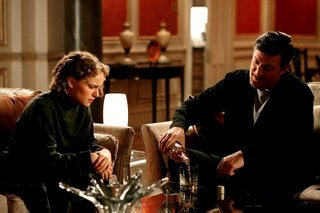 The bulk of the film follows the mysterious man in the mask himself. The great Hugo Weaving plays V, and for an actor who never gets to show his real face, Weaving does as good a job as I’ve ever seen. After Willem Dafoe was brought low by the Green Goblin’s frozen visage, I though this kind of multi-layered performance impossible. Weaving uses subtly suggestive body language and his dynamic voice to convey a lot of emotion from behind his frozen face.
The bulk of the film follows the mysterious man in the mask himself. The great Hugo Weaving plays V, and for an actor who never gets to show his real face, Weaving does as good a job as I’ve ever seen. After Willem Dafoe was brought low by the Green Goblin’s frozen visage, I though this kind of multi-layered performance impossible. Weaving uses subtly suggestive body language and his dynamic voice to convey a lot of emotion from behind his frozen face.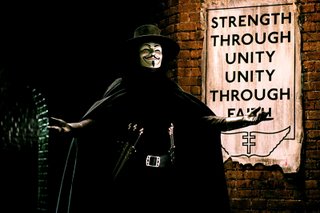 As for the film’s political message, in a post-911 world, it isn’t very clear. V explains how blowing up a building sends a clear message to tyrannical governments to “be afraid of their people”. The film supports V’s cause by side-stepping human casualties, and stacking the deck heavily against a Nazi/Big Brother style government that makes even our current rulers seem mostly harmless. However, there were times when I still questioned his actions.
As for the film’s political message, in a post-911 world, it isn’t very clear. V explains how blowing up a building sends a clear message to tyrannical governments to “be afraid of their people”. The film supports V’s cause by side-stepping human casualties, and stacking the deck heavily against a Nazi/Big Brother style government that makes even our current rulers seem mostly harmless. However, there were times when I still questioned his actions.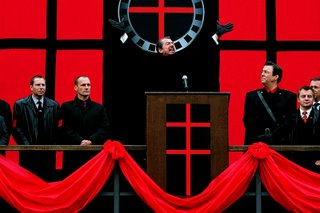 I like Alan Moore’s own take on the story’s politics. He said, “I didn’t want to tell people what to think, I just wanted people to think, and consider some of these admittedly extreme little elements which nevertheless do recur fairly regularly throughout human history.”
I like Alan Moore’s own take on the story’s politics. He said, “I didn’t want to tell people what to think, I just wanted people to think, and consider some of these admittedly extreme little elements which nevertheless do recur fairly regularly throughout human history.”With it’s blistering first and last half-hours and numerous grand set pieces and ideas in the middle, V FOR VENDETTA is the first big release of 2006 worth your time.
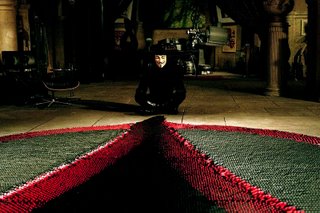



0 Comments:
Post a Comment
<< Home